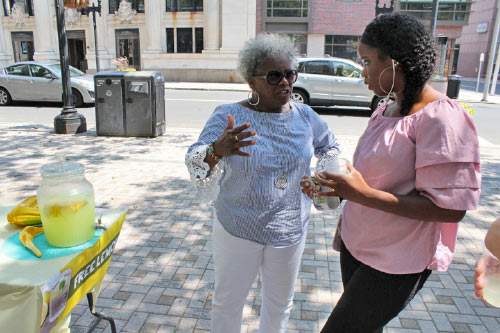Senator Moore Hosts “Gender Pay Gap Lemonade Stand” on Black Women’s Equal Pay Day

BRIDGEPORT— State Senator Marilyn Moore (D-Bridgeport) and women’s equality advocates today marked Black Women’s Equal Pay Day by hosting a “Gender Pay Gap Lemonade Stand” at McClevy Green during lunch hours.
August 7 is Black Women’s Equal Pay Day. The date symbolizes how far black women, on average, must work into 2018 to bring home the same pay as white, non-Hispanic men did in 2017—an additional 7 months! During Sen. Moore’s event, the amount of free lemonade poured into each cup depended on the person’s sex and race, thus representing the disparities in pay throughout Connecticut and the country.
“Many women were not pleased when their cup was not filled to the top, but that’s the financial reality that many women are facing because of the gender pay gap,” Sen. Moore said. “When women aren’t paid equally it’s a drain on families, businesses, and the economy as a whole.”
Here in Connecticut women on average are still earning 83 cents to every dollar that their male counterparts are. This disparity results in an annual wage gap of nearly $11,000. This gap only increases in the case of Black and Latina women, who earn just 63 cents and 54 cents per dollar respectively compared to their white male counterparts.
“It is appalling that in 2018, Black women must work an extra seven months to achieve equal pay,” said Kate Farrar, Executive Director of the Connecticut Women’s Education and Legal Fund (CWEALF). “Though we’ve made progress here in Connecticut, we urge lawmakers to continue to pass solutions to combat the gender wage gap, including comprehensive paid family and medical leave. We applaud and thank Senator Marilyn Moore for her continued advocacy and leadership to uplift women’s economic security and her recognition of this day.”
This year, in an effort to begin closing the gender pay gap, Sen. Moore and Senate Democrats led passage of An Act Concerning Pay Equity. Under this bill, employers would be prohibited from asking prospective employees about their previous wages, as evidence shows women disproportionately carry lower salaries from one job to the next. The new law will be key to reducing the poverty rate of single, working mothers in the state, which is currently at 24.4 percent and will help prevent women from being locked into the status of being offered lower salaries because they were underpaid in their previous jobs.
“While this new law helps us move closer to closing the gender pay gap, it’s still not enough,” Sen. Moore said. “Connecticut also needs to increase the minimum wage, pass earned paid family and medical leave, and end on call shift scheduling. We have a lot more work to do to close this gap and it’s up to all communities to send the right people to Hartford who will fight for pay equity and women’s equality.”
Share this page:
